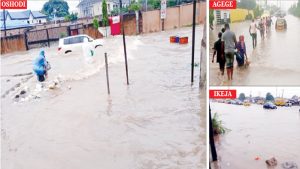 A 10-hour downpour on Wednesday caused widespread flooding across Lagos and Ogun states, bringing businesses to a standstill and collapsing a two-story building in Mushin, Lagos.
A 10-hour downpour on Wednesday caused widespread flooding across Lagos and Ogun states, bringing businesses to a standstill and collapsing a two-story building in Mushin, Lagos.
Seven people were rescued from the collapsed building, and flood-induced traffic disruptions prevented many students from reaching their schools. Flooded roads and homes were reported in areas like Iyana-Oworo, Agege, Ijegun-Isheri Osun, Gbagada, and Lagos Island in Lagos, as well as Atan-Ota, Aseese, Ifo, Sango-Ota, and Ijebu-Ode in Ogun.
The Lagos State Emergency Management Authority urged residents to avoid non-essential travel due to the hazardous conditions. Some schools in the Alimosho area were forced to postpone exams and close for the day.
Residents in the heavily affected White Sand Estate in Isheri-Osun complained of poor drainage infrastructure exacerbating the flooding, which has become an annual problem. Local authorities have been called upon to address the longstanding issue.
The severe weather has disrupted business and transportation across the two states, with commuters facing higher fares and road closures. Experts say improving drainage systems is crucial to mitigating the impact of heavy rains in the region.
In Lagos, a resident reported that a government drainage project on a key link road has been slow and poorly executed, leading to water pooling on the streets. This has snarled traffic, with some commutes taking over an hour. Commercial bus services have been reduced due to the flood conditions.
Some motorists have tried to navigate the flooded roads, but this has damaged vehicles. There are also reports of opportunistic extortion, with hoodlums demanding fees from residents trying to access alternate routes.
The situation is similar in parts of Ogun state, where communities like Sango-Ota, Alagbado, and Atan have been submerged. Residents blame blocked waterways and construction on drainage channels for the devastating floods.
State officials have acknowledged the flooding and urged residents in low-lying areas to relocate temporarily. They have also deployed emergency crews to clear blockages and improve drainage. However, the relentless rain means the floodwaters are slow to recede, causing ongoing disruption.
Experts say the flooding highlights the need for better urban planning and drainage infrastructure to mitigate the impacts of extreme weather in the region.
In Ogun State, there were reports of slight flooding around Joju bus stop, Oju Ore, and Sango-Ota under-bridge, as well as on Iperu-Ilisan Road. The state commissioner for environment assured residents that this was a natural occurrence during peak rainy season and not something to be overly concerned about.
In Edo State, the capital city Benin experienced flooding in several areas like Commercial Avenue, Reservation Road, Ikpopan, Aghobasiwin, Ihama and Adesua Road, disrupting vehicular movement. Residents attributed this to a lack of proper drainage infrastructure.
Ado Ekiti in Ekiti State saw light rain showers that disrupted commercial activities, but there were no reports of flooding.
Akure in Ondo State also experienced heavy rains that slowed down economic and social activities, though no flooding was reported.
In Anambra State, the Neni community was flooded, and there were reports of severe traffic gridlock and extortion by naval officers on the Onitsha-Owerri Road. Flooding was also observed on the Awka-Enugu Expressway.
Overall, the article highlights the impact of heavy rainfall across several states in Nigeria, leading to localized flooding issues, disruption of transportation and economic activities, and infrastructure challenges. The state governments acknowledged these weather-related problems while also providing some assurances and recommendations to residents.

